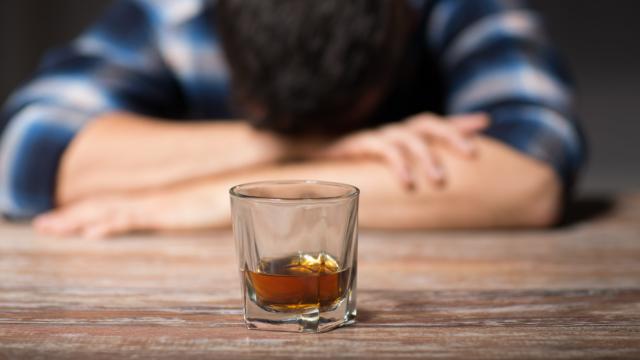The unchecked spread of COVID-19 has likely meant that your life has decisively less options than before. In the Before Times, there were gyms, restaurants, movie theatres, concerts, and basically every amenity offered by the outside world that has since been restricted due to the pandemic, for understandable reasons. And without almost everything your life used to offer, you may have started drinking more often to fill the void.
If this is the case, you’re not alone. I certainly can relate; my monthly budget is drained more than ever by trips to the wine store, and during the eeriness of the pandemic’s early days, my wife and I dedicated at least one night a week to frozen margaritas.
Though drinking is a coping mechanism for the anxiety, boredom, and existential dread that’s defined life in 2020, you should probably cut back a little bit if the activity is starting to become more of a burden than a leisure activity. Here are some ways to curb your alcohol consumption as we slog into what his hopefully a brighter and more promising new year.
[referenced id=”1039295″ url=”https://www.lifehacker.com.au/2020/12/how-to-talk-to-someone-with-a-substance-abuse-problem/” thumb=”https://www.gizmodo.com.au/wp-content/uploads/sites/4/2020/12/08/zv4lozeuvmkfcwdsglz2-300×169.jpg” title=”How to Talk to Someone With a Substance Abuse Problem” excerpt=”Amid all the justifiable clamour online surrounding COVID-19, the flailing economy, and our generally uncertain global future, a TV show about drug addiction and teenagers is managing to cut through the noise. Sunday’s first special episode of HBO’s Euphoria defied its own conventions as a racy show about chaotic lives,…”]
Examine why you’re drinking
There’s some obvious answers born of the particulars of living during a pandemic, sure, but it’s still crucial to ask the question of why you’re drinking. Are you drinking to fulfil a gnawing sense of boredom? Because you’re afraid of the creeping sense of panic that might set in if you don’t dull your senses?
You might be drinking to avoid the feelings that are really ailing you. Examining this question will ultimately be helpful in the long run. As psychologist Kamala Greene Génecé told NPR this week, the answers to this question “will allow you to make specific changes based on the information that you gather.”
Set limits on your drinking
Instead of just drinking habitually or mindlessly, take the opposite approach. It seems almost ridiculous to jot down “wine time” on a calendar, but setting an allocated time during the week for imbibing can keep you on track and reduce your overall consumption (if you stick to it).
Harvard Health advocates setting daily limits, though you can certainly go more than a few days without a drink if you feel it necessary.
As the university writes:
Set a limit on how much you will drink. You should keep your drinking below the recommended guidelines: no more than one standard drink per day for women and for men ages 65 and older, and no more than two standard drinks per day for men under 65. These limits may be too high for people who have certain medical conditions or for some older adults. Your doctor can help you determine what’s right for you.
If you’ve been drinking a lot, take small steps
If the craving for alcohol is seemingly hardwired, especially if you’ve been working all day from your apartment, it might be hard to completely curtail the habit in one day, or even one week. That said, take baby steps. Tapering the habit might be more productive than just stopping it cold turkey.
As the behavioural scientist Clarissa Silva told Huff Post last year:
Replacing your alcohol habit can occur if you manage it incrementally. Trying to deprive yourself at first will result in bingeing later. Set up incremental goals of reducing the amount per session then graduate to daily, weekly and monthly.
Try substituting with exercise, or a new hobby
We’re not living in a golden-era of social interaction or group exercise, so this one obviously comes with a few caveats. But finding some endorphin-release instead of cracking open a beer can bode enormously well for your personal well-being.
Though the links between happiness and exercise are well known in a general pop-science way, studies do show time and time again that there is a close relationship there. A 2018 study conducted by University of Michigan researchers and published in the Journal of Happiness Studies found that, per the New York Times:
People who work out even once a week or for as little as 10 minutes a day tend to be more cheerful than those who never exercise. And any type of exercise may be helpful.
If the urge is too powerful, get professional help
Self-intervention techniques can only go so far if your drinking habits are borne of actual addiction. There’s nothing wrong with admitting this is the issue, of course, and you should be encouraged to know that there are many resources there to help.
First, try friends and family. If your trusted inner circle thinks it’s time for you to get professional help, take their advice seriously and follow through.
For starters, you can call the Substance Abuse and Mental Health Administration hotline at 1-800-662-HELP (4357), or the Alcohol Addiction hotlines at 866-568-6875.
In any case, just know that no matter your level of drinking, it’s always a good rule of thumb to ask whether it’s too much, and if you could benefit from either taking a break or quitting altogether.

Leave a Reply
You must be logged in to post a comment.